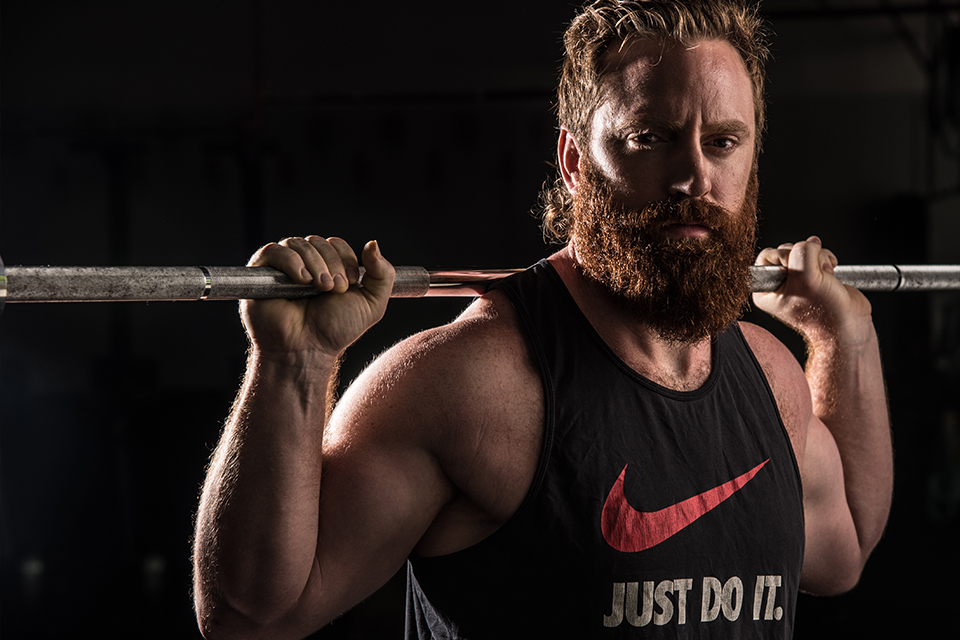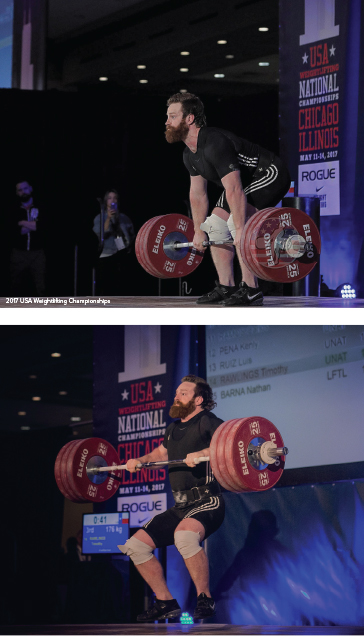Tim Rawlings: Building RaWW (Plant-Based) Strength

This Olympic weightlifting athlete is making gains on a vegan diet and intermittent fasting protocol. He’s a renowned coach here in Austin—so meet the man himself at CrossFit South Lamar, where he focuses on teaching proper weightlifting technique.

When most weightlifters and bodybuilders build strength, they typically take a traditional path—particularly in the kitchen.
Protein shakes, big juicy steaks, raw eggs, gallons of milk, creatine, and 5-3-1 training are widely accepted methods of hacking the barbell and biceps. Most any Bodybuilding.com search, Arnold Schwarzenegger book, or weightlifting coach will surely present these tactics as gospel.
However, Olympic weightlifting master and CrossFit South Lamar Coach Tim Rawlings has another method: Get your greens on, and, sometimes, don’t eat anything at all.
In fact, this method is what helped him hit some of his biggest personal records of all time at the Olympic Weightlifting Nationals in Spring 2017—snatching 140 kilograms (308 pounds), cleaning 190 kilograms (419 pounds), and pushing out his jerk at 185 kilograms (407 pounds).
He currently sits ranked at 16th in the country in his men’s 105kg weight class and trains under another master Oly lifter, Oleg Kechko, a 1996 Olympian from Belarus.
THE SECRET TO GETTING POPEYE STRONG
The 31-year-old Rawlings is no stranger to body “hacking”—self-experimenting with different ways to gain strength and enhance his own fitness.
“I have tried many different diets and many different legal supplements,” Rawlings said.
In his lifelong athletic career, from little league baseball to minor league player to Oly lifter, Rawlings has tried carb-cycling, high-fat and protein-sparing diets, and almost everything else in between.
Constantly studying and reading the latest in research and training hacks, Rawlings became fascinated with the idea of going meat-free as he began to learn more about the poor farming practices of conventional meat and the impact of food quality on gut health.
“Being a natural athlete, I am always looking for an edge, but trying a plant based diet is probably the one thing I hadn’t tried,” Rawlings said.
And while plant-based diets are nothing new, they are typically associated with tree-hugging, Instagram food bloggers and om-chanting yoginis–not 6-foot, 231-pound redheaded, Olympic weightlifters like Rawlings.
However, when Rawlings discovered that the only male from the USA to go to the 2016 Olympics in weightlifting (Kendrick Farris) ate a plant-based diet, he was in. Out with the eggs, whey, and beef, and in with the vegetables, fruits, lentils, beans, nuts, seeds, and whole grains. Oh yes—and occasionally not eating. About the same time as going meat-free, Rawlings also began to do more research on the benefits of intermittent fasting. Consuming your calories within a specific window of the day (typically within 6 to 8 hours) allows for the recovery of the digestive system, one of the body’s strongest and hardest-working muscles. This concept was not totally new to Rawlings since it’s a similar concept to only using his muscles for a certain period each day in the gym.
A typical day’s worth of fueling the 400-pound cleaning machine includes:
Fasting until 1-2 p.m., until right before his training at 3 p.m. when he drinks a protein shake with carbohydrates and electrolytes, followed by the same thing after training.
Dinner is typically around 8 p.m., and consists of vegetables, fruits, beans, and lentils.
“No meat..I don’t count macros, and I usually only eat once a day,” Rawlings said, adding, “I’ve never been stronger, so something’s working for me right now.”
THE REAL SECRET TO GAINING STRENGTH
Ask any knowledgeable trainer about the importance of nutrition, and more than likely they will tell you something like, “It’s what you do the other 23 hours outside of the gym that matters for gains.”
And, of course, we’ve all heard the phrase, “Fitness is 80 percent nutrition.”
In short: Food matters.
“Athletes need to understand that training is a process and you must listen to your body and coach at all times. It takes around eight years to reach your physical genetic potential.”
Diet rules aside though, if there is one thing Rawlings knows first hand from his over 20 years of experimenting with different diets and strength-building methods, it’s this:
"At the end of the day, if you stick to the basics, you will see gains. Eat enough, sleep enough, and train your ass off,” Rawlings said. “The number one thing is to stay consistent. Athletes need to understand that training is a process and you must listen to your body and coach at all times. It takes around eight years to reach your physical genetic potential.”
GROWING A MOVEMENT
Rawlings doesn’t just practice this himself; he has also engrained this in hundreds of athletes, aspiring strength trainees, and weightlifters over the years—particularly CrossFitters. In fact, early on in his career, Rawlings saw a need in the CrossFit culture for learning the art of weightlifting: “When I left baseball in 2010 and started training more weightlifting, CrossFit was also becoming very popular. However, there wasn’t a lot of knowledge surrounding the barbell,” Rawlings said. “The barbell is one of the staples in the CrossFit program, so naturally there was a need for an expert in this field.”
Before moving to Austin two years ago to be closer to his coach, Rawlings began coaching at a CrossFit gym in his hometown of Chicago, where he founded a weightlifting program. In 2015, Rawlings found himself in Austin at CrossFit South Lamar doing the exact same thing.
Rawlings has become quite the coaching phenomenon at CrossFit SOLA, where he welcomes 20 to 30 athletes from all backgrounds and experiences every Monday, Wednesday, Friday, and Saturday to RaWW Barbell. “I love what I do and my biggest mission is to help athletes become stronger, healthier, and happier in the long run,” Rawlings said.
THE ONGOING (STRENGTH) PURSUIT CONTINUES
Strength training and weightlifting is a pursuit that will never be 100 percent satisfied. Strong Men, CrossFit Games athletes, Olympic gold medalists, and globe-gym diehards spend hours and years in the gym perfecting the craft, and Rawlings said he’s in it for the long run, too.
Rawlings advice to all athletes to continue to move their own needle forward? Aside from eating real food, resting, and consistency, Rawlings stresses that everyone needs a coach. “The number one mistake is people thinking they don’t need a coach, and they continue training on their own. Professional athletes have and need coaches—and the right coach for them. No two coaches are alike. It’s never made sense to me why people try to do it on their own or just work with whoever…they will end up confused or injured,” he said.
That said, Rawlings is growing a movement for weightlifters with a variety of ages, goals, and diets here in Austin with his RaWW Barbell Program out of CrossFit South Lamar. If you’re in the business of gaining strength for yourself and wanting to learn from a top dog in the sport of weightlifting, Rawlings may very well be a good place to start.







